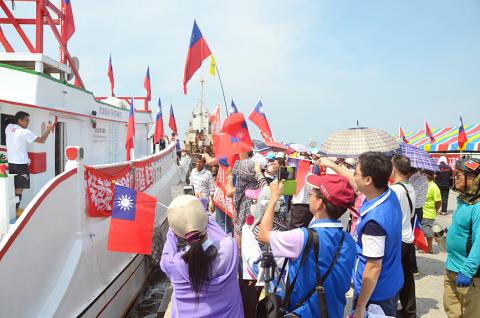Four fishing boats that sailed to Itu Aba Island (Taiping Island, 太平島) in the South China Sea to assert the nation’s sovereignty over the island and its surrounding waters returned to a noisy welcome in Pingtung County yesterday.
The boats arrived at Yanpu Fishing Port (鹽埔漁港) in Hsinyuan Township (新園) at 10am, and were greeted with applause, firecrackers and shouts of “true heroes.”
Chinese Nationalist Party (KMT) Chairwoman Hung Hsiu-chu (洪秀柱) was among more than 600 people in the crowd.

Photo: CNA
More than 1,200 empty plastic bottles were offered to the crowd so that they could take home water the fishing boats shipped back from Itu Aba.
The flotilla sailed for Itu Aba on July 20 in response to a July 12 ruling by the Permanent Court of Arbitration in The Hague, Netherlands.
In a case the Philippines brought against China, the court ruled that all high-tide features in the Spratly Islands (Nansha Islands, 南沙群島), including Itu Aba, are legally “rocks” rather than islands and therefore not entitled to 200 nautical mile (370.4km) exclusive economic zones.

Photo: Yeh Yung-chien, Taipei Times
Although Taiwan was not a party to the case and has said it would not be bound by the ruling, other nations in the region could use it to limit where Taiwanese fishermen can operate, which the fishermen said would hurt their livelihoods.
Three out of the four ships docked at Itu Aba on Monday last week. One ship was not able to dock at the island because it was carrying three reporters from Hong Kong-based Phoenix TV, which was not allowed as permits are required for anyone visiting Itu Aba, as it is categorized as a military-controlled zone.
The ship instead anchored in waters off the island.
Another boat had mechanical problems and did not finish the journey.
The Fisheries Agency yesterday said in a statement that while it respects the fishermen’s motive for sailing to the island, it might still fine them for alleged violations of the Fisheries Act (漁業法) and other laws, to uphold integrity of the law and safeguard the nation’s fishing operations.
People First Party caucus convener Lee Hung-chun (李鴻鈞) said the government should not use the law to intimidate fishermen who sail to Itu Aba in support of the nation’s sovereignty.
Separately yesterday, the Ministry of National Defense said it has rejected Hung’s application to travel to Itu Aba, as Hung is not a public servant and has not been invited to participate in national security-related affairs.

FIREPOWER: On top of the torpedoes, the military would procure Kestrel II anti-tank weapons systems to replace aging license-produced M72 LAW launchers Taiwan is to receive US-made Mark 48 torpedoes and training simulators over the next three years, following delays that hampered the navy’s operational readiness, the Ministry of National Defense’s latest budget proposal showed. The navy next year would acquire four training simulator systems for the torpedoes and take receipt of 14 torpedoes in 2027 and 10 torpedoes in 2028, the ministry said in its budget for the next fiscal year. The torpedoes would almost certainly be utilized in the navy’s two upgraded Chien Lung-class submarines and the indigenously developed Hai Kun, should the attack sub successfully reach operational status. US President Donald Trump

Taiwan Semiconductor Manufacturing Co (TSMC, 台積電) is expected to start construction of its 1.4-nanometer chip manufacturing facilities at the Central Taiwan Science Park (CTSP, 中部科學園區) as early as October, the Chinese-language Liberty Times (the Taipei Times’ sister newspaper) reported yesterday, citing the park administration. TSMC acquired land for the second phase of the park’s expansion in Taichung in June. Large cement, construction and facility engineering companies in central Taiwan have reportedly been receiving bids for TSMC-related projects, the report said. Supply-chain firms estimated that the business opportunities for engineering, equipment and materials supply, and back-end packaging and testing could reach as high as

ALL QUIET: The Philippine foreign secretary told senators she would not respond to questions about whether Lin Chia-lung was in the country The Ministry of Foreign Affairs on Wednesday confirmed that a business delegation is visiting the Philippines, but declined to say whether Minister of Foreign Affairs Lin Chia-lung (林佳龍) is part of the group, as Philippine lawmakers raised questions over Lin’s reported visit. The group is being led by Deputy Minister of Agriculture Huang Chao-chin (黃昭欽), Chinese International Economic Cooperation Association (CIECA) chairman Joseph Lyu (呂桔誠) and US-Taiwan Business Council (USTBC) vice president Lotta Danielsson, the ministry said in a statement. However, sources speaking on condition of anonymity said that Lin is leading the delegation of 70 people. Filinvest New Clark City Innovation Park

TPP RALLY: The clashes occurred near the Chiang Kai-shek Memorial Hall on Saturday at a rally to mark the anniversary of a raid on former TPP chairman Ko Wen-je People who clashed with police at a Taiwan People’s Party (TPP) rally in Taipei on Saturday would be referred to prosecutors for investigation, said the Ministry of the Interior, which oversees the National Police Agency. Taipei police had collected evidence of obstruction of public officials and coercion by “disorderly” demonstrators, as well as contraventions of the Assembly and Parade Act (集會遊行法), the ministry said in a statement on Sunday. It added that amid the “severe pushing and jostling” by some demonstrators, eight police officers were injured, including one who was sent to hospital after losing consciousness, allegedly due to heat stroke. The Taipei